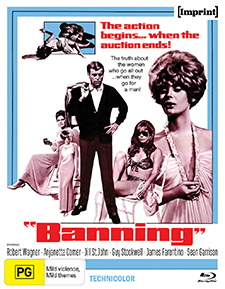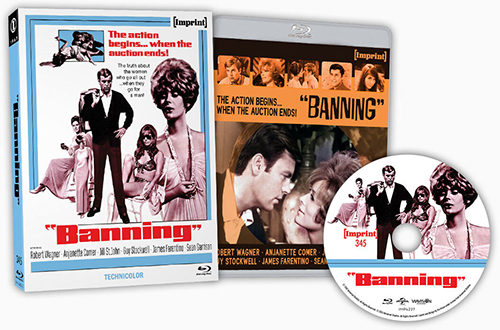Banning (Blu-ray Review)

Director
Ron WinstonRelease Date(s)
1967 (August 28, 2024)Studio(s)
Universal Pictures (Imprint Films/Via Vision Entertainment)- Film/Program Grade: B-
- Video Grade: B+
- Audio Grade: A-
- Extras Grade: B
Review
[Editor’s Note: This is a Region-Free Australian Blu-ray import.]
With the takeover of Universal by talent agency MCA and its Revue Studios, its busy TV production arm, Universal had become an industry leader in television show production and made-for-TV feature films. A handful of prominent names were still connected with the studio—Alfred Hitchcock and actor Gregory Peck, to name two—but the majority of Universal’s theatrical feature output were little more than gussied-up B-pictures. Indeed, around 1967 when Banning was released, the studio attempted a series of cut-rate movies using TV production methods. Many of these were shot in the less expensive Techniscope format, with budgets and schedules comparable to the company’s TV-movies. Incredibly, Banning, a 102-minute feature, was conceived with a 21-day shooting schedule. Even Britain’s Hammer Films averaged around 30-35 days to make one of their 90-minute horror films.
Banning, a drama “not suitable for children” (as proclaimed on the poster), about the back-stabbing, corrupt world of a private country club/golf course, isn’t very interesting but there are glimmers of a more ambitious, adult script.
A long-inactive pro golfer, his reputation sullied by scandal, and now going by the name of Mike Banning (Robert Wagner), is hired as an assistant pro instructor at the exclusive El Presidente Country Club, a playground for the rich, the men drinking and gambling heavily while their wives and girlfriends bed down with the handsome instructors. Two of the latter immediately set their sights on Banning: cynical socialite Angela Barr (Jill St. John) and Cynthia Linus (Susan Clark, making her film debut), wife of top pro Jonathan (Guy Stockwell), and daughter of the club’s arrogant owner, J. Pallister Young (Howard St. John, no relation to Jill). Banning, for his part, is attracted to club employee Carol Lindquist (Anjanette Comer), he unaware that she’s Linus’s mistress.
After losing a week’s salary at a poker game with the cheating Pallister (a good sequence), Banning blackmails him while appealing to his greed, to stage a “Calcutta,” a disreputable, high-stakes golf tournament where Banning hopes to use winnings to pay off an old gambling debt.
The film isn’t without some promise. Screenwriter James Lee worked mainly in television, but television that included credits like Omnibus, The Defenders, and episodes of Roots. His movie assignments also included Counterpoint and Change of Habit, not-good films but admirably offbeat, unusual ones. Director Ron Winston mostly worked in television as well, but with Playhouse 90 shows to his credit and two of the best Twilight Zone episodes: The Monsters Are Due on Maple Street and The Big, Tall Wish. Winston died of a heart at age 40 while rushing to catch a plane.
Banning is as frank and adult as big Hollywood studios could get in this last year before implementation of the MPAA’s ratings system, with a lot of talk about the country club’s members sleeping around with the instructors, though there’s a very dated joke about rape (crude even then), and antihero Banning basically sexually assaults Carol in one scene. The film’s main purpose, in exploring the corruption of the hedonistic rich while the staff at the country club, getting a taste of that world, jockey for position despite their frequent humiliations, is mildly interesting, but not really enough to sustain the feature. An air of artificiality with the picture’s over-lit interiors, melodramatic dialogue, and rushed nature of the production all work against it.
The climatic golf match generates some suspense, helped by actors like Wagner who really could play well, but the screenplay doesn’t set it up coherently, with confusing rules and the like, and it comes too late in the story to salvage the fairly uninvolving narrative. The audience is left wondering why we should care whether Banning’s plans succeed or not.
Gene Hackman, in what was just his third credited movie role, is billed ninth. He has a couple of good scenes as a washed-up, alcoholic pro, showing greater potential as an actor compared to others in the cast, but he has less than 10 minutes of screentime. The late Quincy Jones wrote the musical score, which is better than the picture deserves.
Imprint’s Region-Free Blu-ray, a new 2K scan of an IP (interpositive), is just okay. Two-perf Techniscope can look great, even on big projection systems (e.g., For a Few Dollars More), but this sources an IP, not the camera negative, and the transfer has its share of dirt, scratches, and other imperfections, though it’s okay and the color and contrast are acceptable. Better is the LPCM 2.0 mono, benefiting Jones’s score notably. Optional English subtitles are provided.
Jones’s music can be better appreciated on the isolated music track, one of the many special features. These also include a new audio commentary by film historians Howard S. Berger and Steve Mitchell. Berger also produced A Hole in One: R.J. & Jill Remember Banning, featuring Zoom interviews with Wagner (now 94) and St. John (now 84). They have interesting things to say 57 years after-the-fact. It’s odd watching interviews like these, made so long after a film’s production; it would be like if Blu-ray had existed in 1975, we could have had new interviews with Charlie Chaplin talking about two-reel comedies he made in 1918. The piece runs 19:36.
Members Only: Scoring Banning is a very worthwhile interview with film music historian Jon Burlingame on Quincy Jones. Burlingame knows his stuff, and does an excellent job putting the late composer’s work—and the rise of jazz scores in place of big orchestral ones—into context. This supplement runs 15:27.
Finally, a trailer is included, but Universal never took care of trailer elements of its older films, so what’s presented is in 4:3 panned-and-scanned format.
Banning isn’t very good though it’s far from terrible. Long unavailable on home video, those with an interest in golf, its stars, or 1960s studio films may find it worthwhile.
- Stuart Galbraith IV


